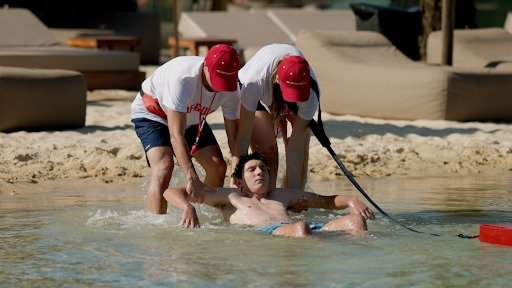Lifeguards are the overlooked individuals who are the most important personnel of aquatic environments. They play a crucial part in defending lives in and around the water. Their full concentration and vigilant activities make them the guardians of the waters, guaranteeing that everybody can appreciate aquatic exercises unafraid.
From clamoring beaches to quiet pools, lifeguards stand prepared to answer emergencies, making their presence vital for a protected aquatic encounter.
The Cautious Watch:
Lifeguards, positioned decisively along water bodies, keep a relentless watch. Their sharp eyes check the water’s surface, expecting likely risks. Their presence fills in as a consoling signal, empowering swimmers and beachgoers to dependably partake in the water. The lifeguard tower turns into an image of wellbeing, a sentinel regulating the aquatic domain.
Prompt Reaction:
Emergencies can emerge all of a sudden, and this is where lifeguards sparkle. Thorough lifeguard training outfits them with the skills to answer quickly and unequivocally. From safeguarding bothered swimmers to controlling first aid, lifeguards are the first line of protection in basic circumstances. Their ability to stay cool headed under tension is a demonstration of their training and commitment.
Powerful Correspondence:
Openness is of the utmost importance in forestalling mishaps and guaranteeing a planned reaction when emergencies happen. Lifeguards use whistles, hand signals, and uproarious, clear orders to coordinate swimmers and pass on important data. Their position and clear correspondence add to a more secure aquatic environment, lessening the risk of mishaps and incidents.
Forestalling Misfortunes:
Lifeguards are not simply rescuers; they are proactive in forestalling misfortunes. Their consistent observation empowers them to distinguish possibly unsafe circumstances before they heighten. By implementing rules, like swimming in assigned regions and keeping away from risky way of behaving, lifeguards contribute essentially to mishap anticipation.
Public Awareness:
Aside from their on the job liabilities, lifeguards are instrumental in raising public awareness about water security. Lifeguard classes close to me offer people the potential chance to learn fundamental water rescue techniques and essential first aid. Lifeguard certificate turns into an identification of obligation, connoting a pledge to the security of oneself as well as other people in aquatic settings.
Lifeguard training:
Lifeguard training is a thorough cycle that covers a scope of skills, from swimming capability to CPR and first aid. The training underlines fast independent direction and proficient execution of rescue techniques. Lifeguards go through reenacted situations to plan for genuine emergencies, guaranteeing they are exceptional to deal with any circumstance with certainty and skill.
Impacts on Surroundings:
Past their job as rescuers, lifeguards become essential individuals from the surroundings they serve. Their presence cultivates a feeling of safety, empowering families and people to participate in water-based exercises. By being congenial and knowledgeable, lifeguards become significant assets for data on water wellbeing and emergency readiness.
Lifeguard certification:
For those trying to become gatekeepers of the waters, looking for lifeguard certification is the first step. Lifeguard classes close to me offer thorough training, covering all that from water rescue techniques to CPR and first aid. Achieving lifeguard certification makes the way for business potential open doors as well as connotes a pledge to guaranteeing the security of others in aquatic environments.
The American Lifeguard Association:
The American Lifeguard Association remains as a reference point in the domain of lifeguard training and certification. With a pledge to greatness, this association guarantees that lifeguards are furnished with the skills and knowledge expected to successfully satisfy their crucial job.
Hopeful lifeguards can trust the American Lifeguard Association to give first rate training and certification, setting the norm for aquatic wellbeing the country over.
Conclusion:
In the vast expanse of waters, lifeguards arise as the guardians, resolutely looking after the security of swimmers and beachgoers. Their training, prompt reaction, and obligation to counteraction make them essential in guaranteeing a safe aquatic encounter.
As we partake in the water’s hug, we should not forget the quiet watchers on the lifeguard towers, standing prepared to spring right into it immediately. The guardians of the waters, typified by the American Lifeguard Association, keep on assuming an essential part in making aquatic environments more secure for everybody.

